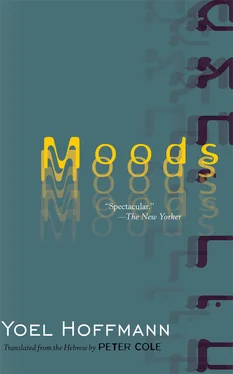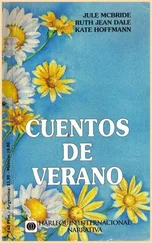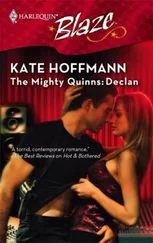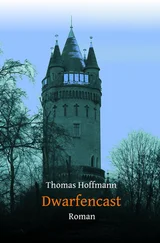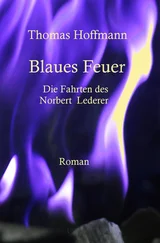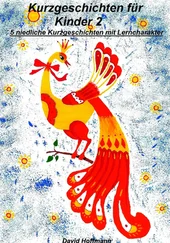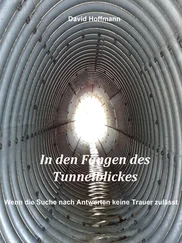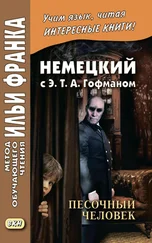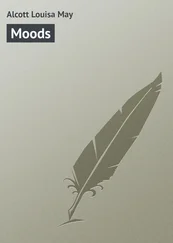But the frogs and cicadas say just one thing, which is most likely very important. Something about the water in the swamp, or the warm air, or the desperate need to mate.
And that’s how it should be in the university. A person should enter and say to everyone (even for an hour and a half or more) things like “I’m Mattityahu. My mother’s name is Rivkah. My father is Eliezar. Yes, please. .” And so on.
[144]
Because once we traveled by bus from Tiberias to Tel Aviv and beside us sat a woman who had a large basket of eggs on her lap.
We didn’t speak at all, but by the time we reached the town of Tabor a great closeness had developed between us and at Hadera we could no longer (which is to say, I could no longer) think of ourselves as alone in the world.
The hardest moment came at the Central Bus Station when the woman got off the bus and went somewhere else. Then we thought (as our heart emptied), What’s Iphigenia in Aulis to us? Or macroeconomics? Or sociology? Or the conjugation of verbs? Or theories concerning metallic strength and tensility? Or generally, what’s what they call perspective or point of view to us? We wanted to lie down under the great wheels of the bus and die. And we swear before man and eternity (and that includes all the psychologists and their ilk) that we’ve never been more sane than we were at that moment, when that woman with the eggs left us behind.
[145]
Each time we think that we’ve come to the end of the book we’re reminded of something else to say. We remember how our children were very young and how, as we held their hands and hurried from place to place, they flew in the wind like kites.
We also recall how we were offended in all sorts of places. Especially in Switzerland. Everything there (including the landscape) was so utterly orderly, and as a result we were hurt to the core (or maybe that should be to the cores).
The visible police directed things outside, and the hidden police held sway within. The moment we crossed the border, we were sent (one can’t say we were thrown, since no one throws things there) into an internal prison, one of those places where everyone sits in a cell made of iron and sees his neighbors through bars on the side and his guards through bars in front of him.
We also recall Lake Biwa, which resembles a huge violin, and when it’s still one can see the cities on the opposite shore doubled there, above and in the water.
[146]
And we remember also the thousands of candles that the Japanese float on the surface of the lake. These are the souls of family ancestors and maybe my great-grandfather Ausiás Goldschlag was among them as well.
We’re imagining him hovering over the face of the waters, his great beard singed by the flame of the candle and the Japanese all around him staring in wonder but bowing politely.
One should perhaps explain these memories (a brain and so on) but we’re sparing our readers explanations of that sort. For they too (the readers) deserve a little rest. So they can spread the fields of their recollection far from the skull and toward the cities and the villages of Europe, toward Baghdad and Kurdistan and Morocco and Algeria, enormous regions — larger than the box of the brain by a factor of more than a million.
In the end, the paper boats sink in the water and the candles descend to the bottom of the lake. The celebrants shake the dust from their kimonos and go home. And this too we won’t let anyone explain.
[147]
Once, in Mea She’arim, we ran into a demonstration against the practice of carrying out autopsies. Garbage bins were burning in all four corners of Sabbath Square. People shouting verses from the Psalms were shoving us up the slope on Strauss Street. The smoke from the burning plastic brought tears to our eyes and for a moment we imagined that we were weeping for the dead whose dignity had been violated.
In fact, we thought (like a wandering violinist who stumbles onto a string orchestra) — Why do we need to cut into the flesh of someone after they die? Finally, after a life of sorrow and trouble a man lies in absolute peace on his back. If one really wants to know what the cause of death is one could write on the relevant documents “Birth,” and if one really wants to know what the cause of birth is, one could write there “Death.” And even if we cut into the dead man’s tissue we’ll find more tissue beneath it and beneath that still more, whereas the secret is much more likely to be found in the open mouth of the dead man, out of which his spirit passed, or in the open mouth of the world, proof of which lies in the sun and stars.
[148]
We’re asking ourselves if, before the creation of the world, it was determined that the great novels ( War and Peace or Crime and Punishment ) would be written.
It’s clear that God didn’t conceive of them. He’s very sparing with words, and when he does speak the results are seismic (see for instance Genesis 1), but it may well be that these works were, as they say, within him, like civilization as a whole.
Sometimes writers say that they’re only vessels in the hands of God. Some French writers have even tried what’s called automatic writing. That is, they themselves didn’t interfere in what was written on the paper. One of them would write the word shutters maybe seventy times. Most likely at that very moment God felt a terrible sense of constriction.
My grandfather, Isaac Emerich, would sigh every so often and say, Ach, mein lieber gott (Oh, Good Lord), but if we ask ourselves if his complaint was predetermined as well, we’ll never find our way out of this maze, not even if we address the question to the Department of Philosophy, in writing.
[149]
Tonight is New Year’s Eve. Tomorrow’s January 1, 2009. We greet our readers (also those who don’t read our books) and wish them this: that in the coming year they should read only good books. Michael Rips’s The Face of a Naked Lady , for instance.
There’s no point in talking about wretched humanity that’s sending artillery shells in every direction tonight. God have mercy on everyone.
[150]
Now it’s below zero. Think about these words below zero . Less than nothing.
When we were in Japan we read in books by religious sages that it’s possible to get below zero and then to walk around above zero as though one were still beneath it. Something like abstracting the form from things and nevertheless leaving them as they are.
Once we knew a woman by the name of Rivkah who always said “It’s nothing,” and nevertheless bought herself blouses and dresses and the like.
As far as we’re concerned, we prefer the rabbis
a) because of their beards
b) because of their Yiddish
c) because they know that everything’s nothing but don’t say so, so as not to spread sorrow through the world.
[151]
Outside, everything’s frozen. We bring the dogs into the house. The cats go into the empty doghouses and warm themselves against each other’s bodies. But what do the wild boars in the brush do? The jackals? The birds?
Language too gets twisted. Entire words freeze in the mouth, and we need to stand beside the stove to thaw them out.
Which reminds us of the story that Wilhelm Busch wrote about Peter, who wouldn’t heed the warnings he’d received and went out to play one winter’s day and didn’t return. His father and mother sat at home and wept, but a hunter found him in the woods and brought him back, frozen as a block of ice, and his father and mother were very happy and led him toward the stove and watched with joy as he thawed out, but, alas, in the end, all that remained of him was a puddle of water and his broken-hearted parents gathered the water up into a jar and put it on the shelf between a jar labeled CUCUMBERS and another labeled SALT and wrote on it PETER.
Читать дальше
